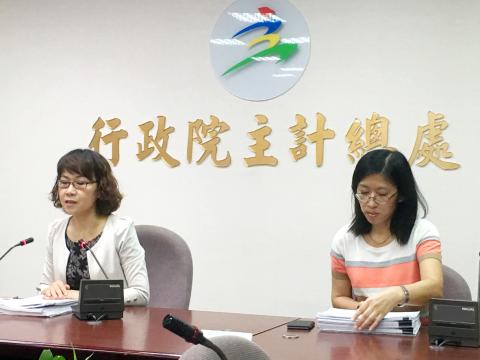After three consecutive quarters of decline, the economy rebounded in the second quarter with year-on-year growth of 0.69 percent, supported by better-than-expected exports, the Directorate-General of Budget, Accounting and Statistics (DGBAS) said yesterday.
The 0.69 percent growth was higher than the 0.48 percent growth the DGBAS forecast in May.
“By the latest data, we could say that the economy is stabilizing slowly. Some local industries showed a positive outlook, such as the electronic components industry,” DGBAS section head Wang Shu-chuan (王淑娟) told a news conference.

Photo: Cheng Chi-fang, Taipei Times
Exports of electronic goods increased by 1.9 percent year-on-year in the second quarter, ending four quarters of contraction, thanks to a recovery in the semiconductor industry, the statistics agency said in a statement.
A sharp decline in the number of Chinese tourist in the second quarter had no obvious impact on the economy as tourists from other nations, such as Japan and South Korea, filled the gap, Wang said.
After price adjustments, real exports, including exported services and goods, increased by 0.65 percent in the second quarter, better than the agency’s 0.29 percent growth forecast, DGBAS data showed.
Private consumption in the second quarter rose 1.05 percent year-on-year, led by a 4.71 percent increase in new car purchases on the back of government subsidies.
However, capital formation — the net additions of equipment, buildings and other intermediate goods — declined 3.11 percent last quarter from the previous year, as the appreciation of the yen dragged down local capital formation, Wang said.
Nearly one-third of the nation’s machinery is imported from Japan, she added.
By sector, GDP growth in the second quarter was led by the output of financial and insurance companies, which climbed 1.6 percent from a year earlier, while manufacturing sector remained sluggish on muted demand with output falling 0.12 percent year-on-year, the smallest decline in five quarters, according to DGBAS.
The second quarter’s mild economic growth has not changed the agency’s full-year GDP estimate of 1.06 percent, Wang said.
In the first half of this year, GDP increased slightly by 0.01 percent from the previous year and the economy might remain weak in the second half due to various macroeconomic uncertainties including terrorist attacks, Brexit impacts and the rise of protectionism, Wang said.

PREPAREDNESS: Given the difficulty of importing ammunition during wartime, the Ministry of National Defense said it would prioritize ‘coproduction’ partnerships A newly formed unit of the Marine Corps tasked with land-based security operations has recently replaced its aging, domestically produced rifles with more advanced, US-made M4A1 rifles, a source said yesterday. The unnamed source familiar with the matter said the First Security Battalion of the Marine Corps’ Air Defense and Base Guard Group has replaced its older T65K2 rifles, which have been in service since the late 1980s, with the newly received M4A1s. The source did not say exactly when the upgrade took place or how many M4A1s were issued to the battalion. The confirmation came after Chinese-language media reported

The Taiwanese passport ranked 33rd in a global listing of passports by convenience this month, rising three places from last month’s ranking, but matching its position in January last year. The Henley Passport Index, an international ranking of passports by the number of designations its holder can travel to without a visa, showed that the Taiwan passport enables holders to travel to 139 countries and territories without a visa. Singapore’s passport was ranked the most powerful with visa-free access to 192 destinations out of 227, according to the index published on Tuesday by UK-based migration investment consultancy firm Henley and Partners. Japan’s and

A Ministry of Foreign Affairs official yesterday said that a delegation that visited China for an APEC meeting did not receive any kind of treatment that downgraded Taiwan’s sovereignty. Department of International Organizations Director-General Jonathan Sun (孫儉元) said that he and a group of ministry officials visited Shenzhen, China, to attend the APEC Informal Senior Officials’ Meeting last month. The trip went “smoothly and safely” for all Taiwanese delegates, as the Chinese side arranged the trip in accordance with long-standing practices, Sun said at the ministry’s weekly briefing. The Taiwanese group did not encounter any political suppression, he said. Sun made the remarks when

BROAD AGREEMENT: The two are nearing a trade deal to reduce Taiwan’s tariff to 15% and a commitment for TSMC to build five more fabs, a ‘New York Times’ report said Taiwan and the US have reached a broad consensus on a trade deal, the Executive Yuan’s Office of Trade Negotiations said yesterday, after a report said that Washington is set to reduce Taiwan’s tariff rate to 15 percent. The New York Times on Monday reported that the two nations are nearing a trade deal to reduce Taiwan’s tariff rate to 15 percent and commit Taiwan Semiconductor Manufacturing Co (TSMC, 台積電) to building at least five more facilities in the US. “The agreement, which has been under negotiation for months, is being legally scrubbed and could be announced this month,” the paper said,